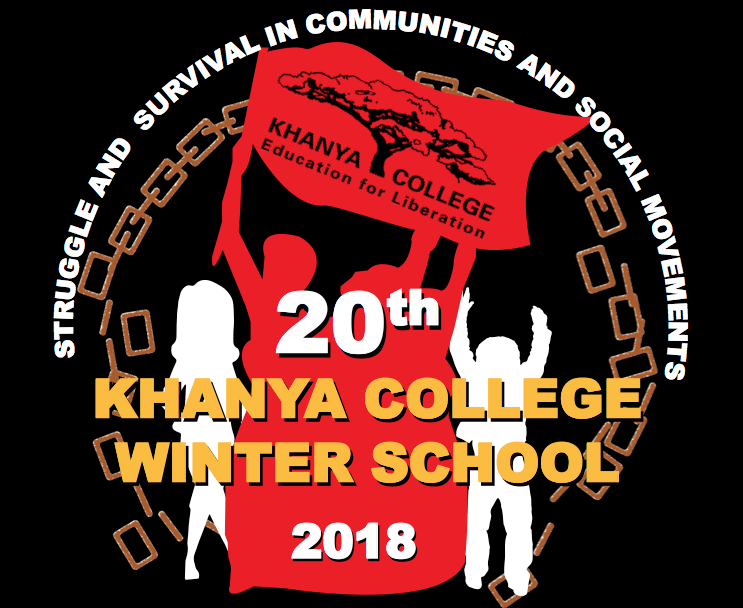The 25th Khanya College annual Winter School, kicked off on 15 July 2024. The school which started on 14 till 20 June 2024 is currently underway at the House of Movements, Khanya College, in Johannesburg. Comrade Nosipho Mdletshe who is a coordinator of the winter school spoke briefly about this year’s theme before asking the participants to introduce themselves and their organisations.
The mood was quite lively with lots of positive energy as the participants shared about the struggles in their communities and organisations. Notably, the activists used a variety of local languages including Afrikaans, reflecting the different backgrounds and regions in South Africa. One participant criticised the youth for their lack of interest in an important activity which was agriculture.
This year the areas of activism in the school range from gender liberation, unemployment, agriculture, child development, the arts and culture, service delivery, environmental work including recycling, and community development. Activists further mentioned the campaigns taken up by their organisations to solve social issues in their communities. Some of these campaigns are a mental wellness campaign, door-to-doors campaigns, petitioning, housing campaigns, consistent imbizos (gatherings) and speak-outs, land occupations, water campaign, and a road awareness campaign.
The different elements of the ceremony were punctuated by beautifully struggle songs reflecting working class demands and positions in society today. Father Mokesh Morar, in his capacity as Khanya board member, spoke glowingly about the small actions to help change society. He said activists should keep doing “the small things to bring about change…”
The next speaker was Khwezi Mabasa, a representative from Friedrich Ebert Stiftung (FES), he talked about the work of the FES, saying that it works with the “broad left” which includes trade unions and civil society – hence their relationship with Khanya College, but he also said they also work with youth organisations and other social justice organisations. Mabasa did not hide the political nature of the FES, later elaborating on the link to the German political party The Social Democratic Party of Germany.
The Khanya Director, comrade Maria Van Driel affectionately known as Cde M was the last speaker, she unpacked the theme which is livelihoods and mutual aid, emphasising the context of raging neoliberalism in South Africa and the urgent need for working class to organise, “Khanya College is a catalytic organisation and not an [just] NGO anymore… the organisation is orient[at]ed to the working class needs”.
She continued by saying, “Khanya’s role is not to struggle for the working class, Khanya’s role is to struggle with the working class. We believe that only the working class can liberate itself.”
This perspective is why Khanya looks at how to organise the working class, at movement building.
Comrade M then turned to speak about the context under which working class people live, highlighting problems facing the poor while making evident the need for solidarity and mutual aid. She noted the existence of diseases of capitalism such as those borne by malnutrition itself created by designed scarcity.
For a piece of good news, she noted that the COVID-19 pandemic-induced lockdowns of 2020 highlighted basic needs for humans, which was the need for food, shelter, air to breathe, clothing and to be cared for, amongst other basic needs. “There is enough for everyone but how society is organised [capitalism] means that a few take the best for themselves.”
To be sure of the fact that hunger prevails within the working class, Comrade M pointed at the evidence of the 2021 riots in SA where people young and old were seen carrying foodstuff from the big retail stores at the malls. She then told the participants that only struggle will change the conditions.
The 1994 liberation in South Africa was a result of organising, mutual aid, and campaigning. In 1996 the ANC government enacted the neoliberal Growth, Employment, and Redistribution macroeconomic policy but by 1999 Khanya responded to the growing impact of this policy by starting the winter school to help educate activists and give them skills to organise. Cde M spoke about choices while encouraging activists to stay the course.
The session ended with a memoriam segment, remembering fallen heroes of working class, participants also got an opportunity to remember fallen heroes from their organisations and communities that has made an impact in the working class. For Khanya College, the late Comrade Oupa Lehulere’s contribution and lasting works remain esteemed. Comrade Maria said that she deeply feels the loss of that brilliant organiser and teacher of the working class who helped formulate the winter school and drove it until he could not physical do so anymore. 25 years later, the format of the school is still an example of a model for the working class to carry on popular education.
This article was submitted as part of the Imbila Yesu publication produced daily for the duration of the Winter School in 2024 (14-20 July 2024). It appeared in Edition 2, released on 16 July 2024.
You may republish this article, so long as you credit the author and Karibu! Online (www.Karibu.org.za), and do not change the text. Please include a link back to the original article.


 Download PDF
Download PDF
